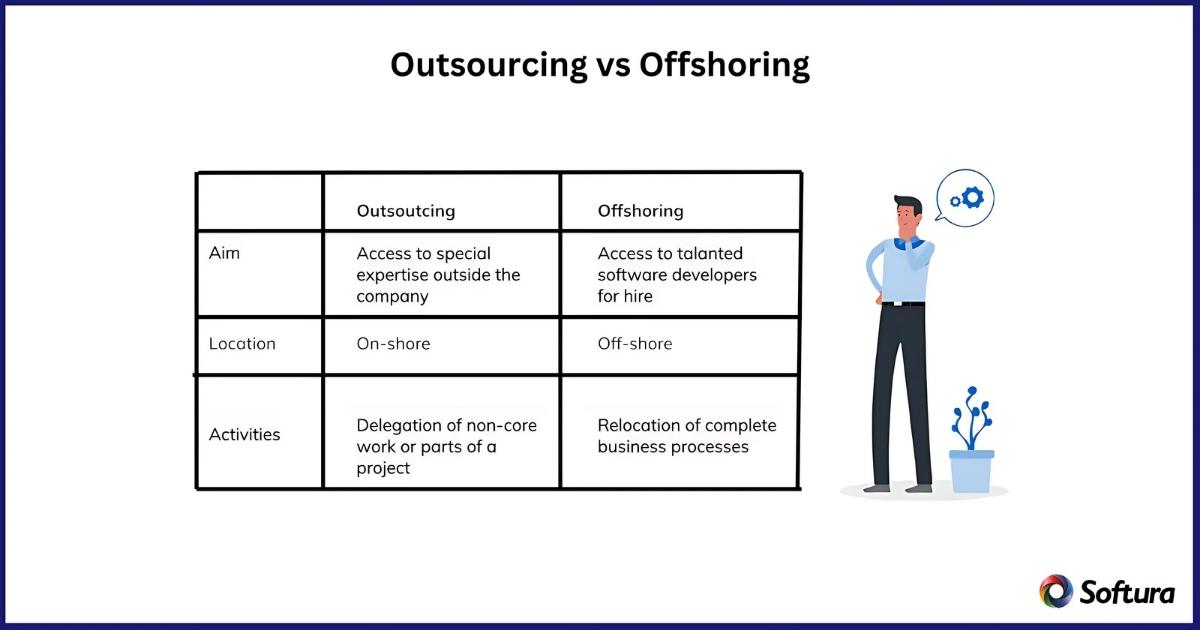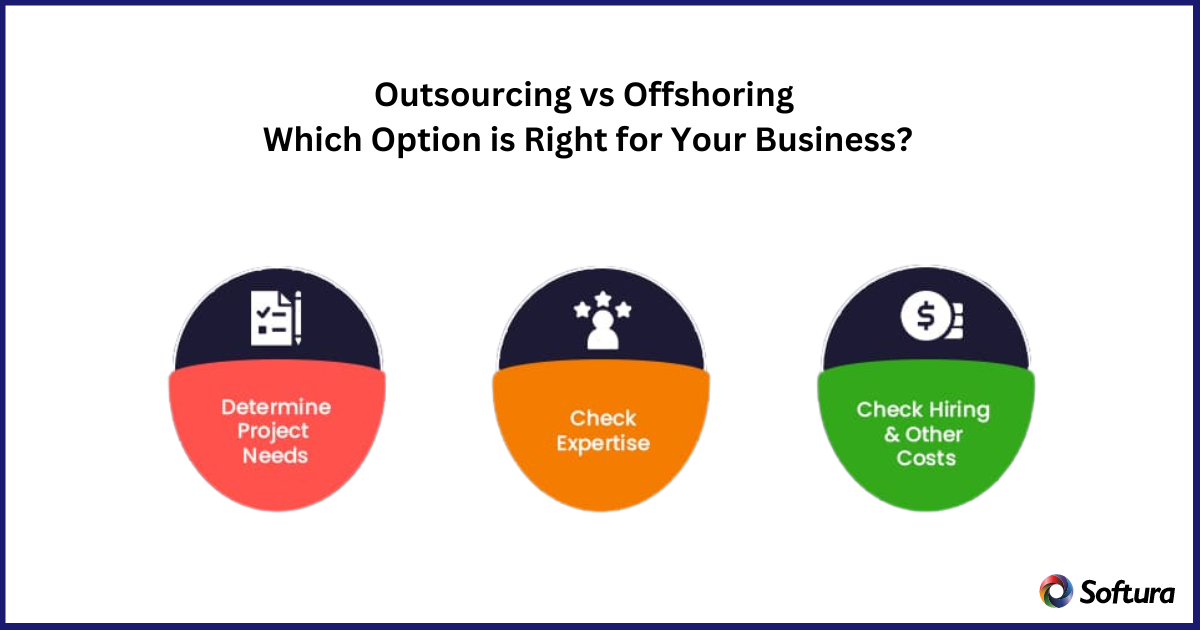"Our integration with the Google Nest smart thermostats through Aidoo Pro represents an unprecedented leap forward for our industry."
- Antonio Mediato, founder and CEO of Airzone.
Outsourcing vs Offshoring
Outsourcing is when a company hires an external firm to handle specific business tasks or processes on outsourcing vs offshoring. It can be local or international.
Offshoring specifically refers to moving business operations to another country, mainly for cost savings.
For example, a company based out of New York outsourcing its customer service to a local call center versus offshoring it to a center in India.

Location:
Example: You can outsource your payroll to a local firm down the street, but offshoring would involve moving it to a firm in a country like the Philippines.
Cost
Business Case: A manufacturing company might offshore its production to Vietnam to cut costs but outsource its HR functions to a domestic provider for greater efficiency.
Control and Management
Example: A retail company outsourcing its IT support to a vendor may have less say in daily operations than if they offshore and manage their own team in Eastern Europe.
Cultural and Language Differences
Example: A company offshoring software development to Ukraine may need to account for different work habits or holidays, whereas outsourcing it to a nearby U.S. vendor may not require these adjustments.
Time Zones
For instance, if a London-based marketing agency offshored design work to Thailand, it involves a 7-hour time difference. While this could help with 24-hour productivity, it also requires careful coordination for meetings.
Skill Access
Example: A company that offshores its supply chain management to China may face risks from trade disputes, while outsourcing domestically could carry less geopolitical risk.
Speed of Setup
Example: A business needing immediate customer service support outsourced to a local company within weeks, while setting up an offshore team in Mexico took several months.
Focus on Core Competencies
"Our integration with the Google Nest smart thermostats through Aidoo Pro represents an unprecedented leap forward for our industry."
- Antonio Mediato, founder and CEO of Airzone.

Choosing between outsourcing vs offshoring depends on your,
If cost savings are the primary concern and you need highly skilled labor, offshoring might be the better choice.
For example, a software development company may offshore coding tasks to Eastern Europe to cut costs while maintaining high quality.
On the other hand, if you need to delegate non-core tasks without dealing with international logistics, outsourcing is likely the better fit.
Consider a mid-sized retail company that outsources its IT support to a local vendor to ensure quick turnaround and fewer cultural or time-zone challenges.
Your Company’s Needs: Do you need to scale quickly with minimal setup, or are you looking for long-term savings and control over operations?
Outsourcing may be quicker to set up, while offshoring is often more complex but offers bigger cost advantages over time.
Business Example: When IBM needed to streamline its customer support, it outsourced to a domestic firm. In contrast, when they sought lower production costs, they offshored manufacturing to China.
"By analyzing the data from our connected lights, devices and systems, our goal is to create additional value for our customers through data-enabled services that unlock new capabilities and experiences."
- Harsh Chitale, leader of Philips Lighting’s Professional Business.
Onboard dedicated Offshore App Developers
Develop Mobile application and integrate it into your business processes with Softura's dedicated offshore mobile app developers!
What are my core competencies, and what can I delegate?
If the task is non-core, outsourcing or offshoring could be a good fit.
What is my budget?
Outsourcing might be less expensive in the short run, while offshoring offers long-term savings but comes with initial setup costs.
Do I need to maintain control over the process?
Offshoring offers more control if you set up your own operations, but outsourcing relies on external providers.
What level of expertise do I need?
Outsourcing may give you quick access to experts. Offshoring allows for more control over hiring specific skills.
How important is time zone alignment?
Outsourcing vs offshoring to local providers can eliminate time zone challenges, while offshoring can create 24/7 workflows with teams in different zones.
How complex is the task?
Simple tasks may be easier to outsource, whereas more complex, ongoing work could benefit from offshoring.
What risks am I willing to take?
Are you comfortable with political or economic risks associated with offshoring, or do you prefer the stability of outsourcing to local firms?
How quickly do I need the service up and running?
Outsourcing can be implemented quickly, while offshoring may take longer due to legal, logistical, and operational hurdles.
What level of communication do I need?
Outsourcing vs offshoring often allows for better communication with local vendors, while offshoring requires overcoming language and cultural barriers.
What are the long-term goals for my business?
Outsourcing may provide quick wins, but offshoring can offer significant long-term advantages in cost and scalability
"By analyzing the data from our connected lights, devices and systems, our goal is to create additional value for our customers through data-enabled services that unlock new capabilities and experiences."
- Harsh Chitale, leader of Philips Lighting’s Professional Business.
"By analyzing the data from our connected lights, devices and systems, our goal is to create additional value for our customers through data-enabled services that unlock new capabilities and experiences."
- Harsh Chitale, leader of Philips Lighting’s Professional Business.
So, outsourcing vs offshoring – what have you decided?
Choosing between these two depends on your business's specific needs, goals, and resources. If you're looking for quick implementation and minimal risk, outsourcing can be the right option, especially for non-core functions. It helps reduce costs without the complexities of international operations. On the other hand, offshoring offers long-term cost savings and greater control over processes. However, it involves more setup time and risks like cultural differences and political instability. Ultimately, the decision hinges on whether you prioritize speed and simplicity or cost efficiency and control over operations.
Software development Outsourcing your projects to Softura, the Michigan-based software outsourcing team with affordable offshore teams in India. Contact us to schedule a no-cost connsultation.
"Our integration with the Google Nest smart thermostats through Aidoo Pro represents an unprecedented leap forward for our industry."
- Antonio Mediato, founder and CEO of Airzone.
Are you ready for your next project?
Unlock your company's full potential with our comprehensive Software development services. Contact our experts today to discuss how we can drive your success together.